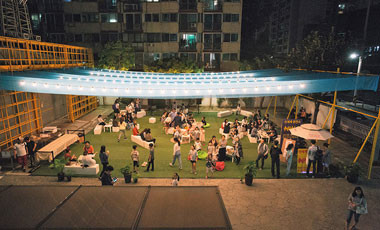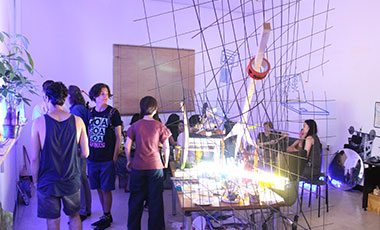
TASTEHOUSE × WORKS, OoH (2021). Exhibition view: One Escape at a Time, 11th Seoul Mediacity Biennale, K-Pop Square, Seoul (8 September 2021–21 November 2021). Courtesy Seoul Mediacity Biennale. Photo: Cheolki Hong, glimworkers.
Timeless yet current, boundless yet grounded, and connected yet isolated, the 11th Seoul Mediacity Biennale, One Escape at a Time (8 September 2021–21 November 2021), utilises escapism to find connections in a world upended.
Directed by Yung Ma, 58 artworks by 41 artists have been organised under a show title inspired by the sharp-witted Netflix sitcom One Day at a Time (2017–2020), based on an original 1970s production, that revolves around a Cuban American family living in Los Angeles and tackles urgent socio-political issues such as racism, gender, class, sexuality, identity, and migration.

Exhibition view: One Escape at a Time, 11th Seoul Mediacity Biennale, Seoul Museum of Art, Seoul (8 September 2021–21 November 2021). Courtesy Seoul Mediacity Biennale. Photo: Cheolki Hong, glimworkers.
The main exhibition, staged over the entire three floors of the Seoul Museum of Art, creates room for nostalgia and reimagination, with the majority of works utilising popular culture—from sitcoms, film, comics, literature, to advertisements—to encourage critical contemplations on life today.
On the first and second floors, some works draw from the 1980s and 90s in Hong Kong and Mainland China. Sarah Lai's installation Gang Killer (2021), located on the first floor, is staged like a piano bar, with three separate walls set apart from each other to create a scene.

Sarah Lai, Gang Killer (2021). Exhibition view: One Escape at a Time, 11th Seoul Mediacity Biennale, Seoul Museum of Art, Seoul (8 September 2021–21 November 2021). Courtesy Seoul Mediacity Biennale. Photo: Cheolki Hong, glimworkers.
One wall hosts a bar entrance with neon light on one side, and translucent glass invoking the interior of a bar on the other. Two other walls, one covered with the image of a lone character in a bar with bloodstains, complete the enclosure; emblazoning their outer edges is the phrase 'KILLER GANG 01' and the image of a shotgun pointed at the viewer.

Sarah Lai, Gang Killer (2021). Exhibition view: One Escape at a Time, 11th Seoul Mediacity Biennale, Seoul Museum of Art, Seoul (8 September 2021–21 November 2021). Courtesy Seoul Mediacity Biennale. Photo: Cheolki Hong, glimworkers.
An empty table and hanging light installed together complete the scene, creating a visceral and heightened mood that recalls John Woo's classic Hong Kong film The Killer (1989), a stylish action thriller made the year of the Tiananmen Square crackdown that taps into the turbulence of the times.

Exhibition view: One Escape at a Time, 11th Seoul Mediacity Biennale, Seoul Museum of Art, Seoul (8 September 2021–21 November 2021). Courtesy Seoul Mediacity Biennale. Photo: Cheolki Hong, glimworkers.
Nostalgia shifts to romance in Liu Chuang's Love Story (2013/2021), a series of digital inkjet prints depicting 17 pages from romance novels popular in Mainland China during the 1980s and 90s, mostly written by authors in Taiwan and Hong Kong.
Chuang bought the publications from a book rental store in Dongguan, an industrial city inhabited by many young female workers, and recomposed the anonymous hand-written notes made by the readers found on book pages into each print.

Exhibition view: One Escape at a Time, 11th Seoul Mediacity Biennale, Seoul (8 September 2021–21 November 2021). Courtesy Seoul Mediacity Biennale. Photo: Cheolki Hong, glimworkers.
One print illustrates a book cover of lovers together with personal comments on pages, including 'This is not a job, but rotten, 2010' and 'Foreign factory, China factory, Foreign factory, China factory ... Back home.'
‘Throughout, nostalgia becomes a theme that resonates beyond a longing for the past...’
Such notes resonate in the context of South Korea, where light industrial cities such as Ansan have become the centre of political debates surrounding migrant labour, with migrant workers from Mainland China and Southeast Asia subjected to harsh restrictions during the pandemic without the provision of better working or living conditions.



